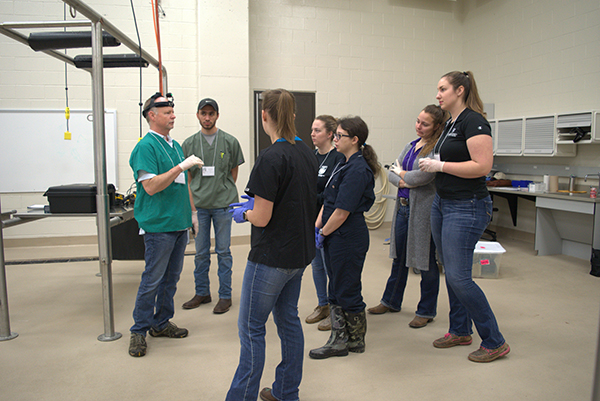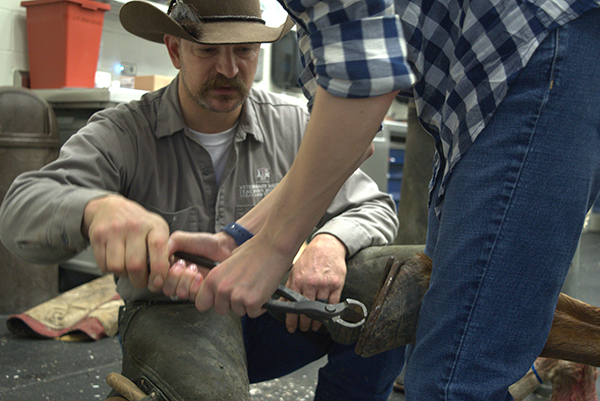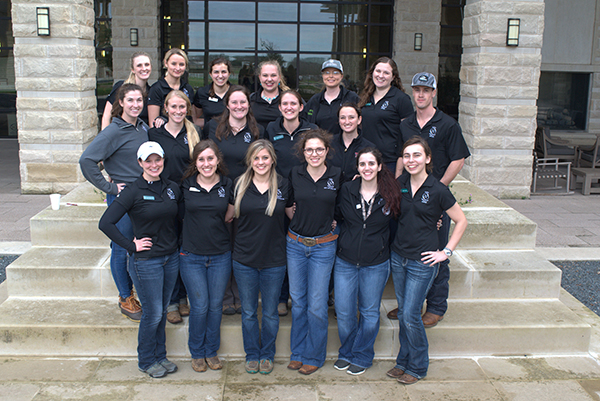A few weeks ago, Texas A&M’s Student Chapter of the American Association of Equine Practitioners (EP, for short), hosted our annual wet lab. It is a huge endeavor, with student participants from more than 20 different veterinary schools participating and more than 100 clinicians, technicians, and volunteers helping make the event possible.
 I serve as the logistics co-chair for the wet lab, and getting to see everything come together after nearly a year of working to host the event was incredible.
I serve as the logistics co-chair for the wet lab, and getting to see everything come together after nearly a year of working to host the event was incredible.
We had more than 20 labs for students to choose from, with topics ranging from dentistry to hindlimb lameness evaluation.
Sponsors generously provided resources for these labs, and clinics from across the country came to speak with students during the job fair that is part of the event. We always fill everyone up with Texas barbecue and offer a keynote speaker after a morning packed with equine medicine.
I got involved with EP when I was in my second semester of veterinary school. I had made a ton of new friends and they convinced me to join, despite the fact that I am in no way a horse person.
 Now, don’t get me wrong, I think horses are fascinating creatures; their athletic abilities are absolutely remarkable and their digestive system is possibly even more impressive. However, I never had any intention of working specifically with horses.
Now, don’t get me wrong, I think horses are fascinating creatures; their athletic abilities are absolutely remarkable and their digestive system is possibly even more impressive. However, I never had any intention of working specifically with horses.
So, there I was, a little first-year student, in a room full of horse people in a meeting all about horse medicine. And I was fascinated.
A few weeks into my EP club membership, my new friends were telling me that I should apply to be a wet lab co-chair, a two-year position in which you serve on the planning committee for the largest wet lab on campus.
I think my initial response was to laugh because I knew that the wet lab was a huge event all about horses and that my knowledge of horses and horse medicine was slim to none.
Despite all of that, with the encouragement of my friends who had applied, I decided to take on the logistics co-chair role because that seemed like the job that required the least amount of horse knowledge.
 Fast forward to this year’s event, during which we ran around like crazy all day but had an incredible turnout and wonderful feedback from participants. I even got to spend considerable time with some really sweet horses, and I have to say, they are growing on me.
Fast forward to this year’s event, during which we ran around like crazy all day but had an incredible turnout and wonderful feedback from participants. I even got to spend considerable time with some really sweet horses, and I have to say, they are growing on me.
I am already looking forward to next year’s wet lab and putting in even more work to continue making this event a huge success.
The people I work with on the planning committee and all of the incredible clinicians who assist us in making this event a reality are what make this position enjoyable. Getting to know each of them, knowing all of the hours they spent perfecting their individual areas of the wet lab, and then watching everyone shine on wet lab day was one of my favorite veterinary school experiences thus far.
What I’ve learned is that when an opportunity presents itself to step outside of your comfort zone and you have trusted friends and colleagues supporting you, do it!
You never know when you might happen upon something that you truly love.

 I have the honor of serving as the vice president of my veterinary school class and part of my job is to facilitate the mentor/mentee program that pairs second-year mentors with incoming first-year students.
I have the honor of serving as the vice president of my veterinary school class and part of my job is to facilitate the mentor/mentee program that pairs second-year mentors with incoming first-year students.